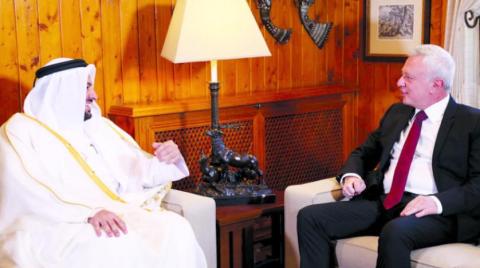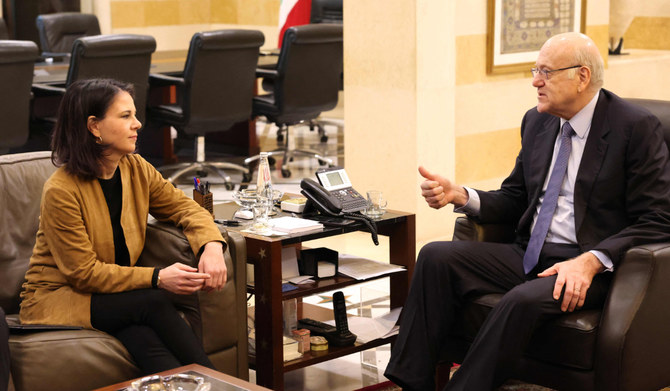
Interior minister says steps will be taken to prevent smuggling and combat the drugs threat
BEIRUT: Lebanon’s Prime Minister Najib Mikati on Monday held a number of meetings designed to help restore Arab trust in Lebanon, and the country’s diplomatic and economic relationships with Saudi Arabia and other Gulf states.
It followed an agreement, announced in Jeddah on Saturday, by French President Emmanuel Macron and Saudi Arabia’s Crown Prince Mohammed bin Salman to work together to help the people of Lebanon.
The participants in extended meetings at the Grand Serail, the prime minister’s headquarters, included Defense Minister Maurice Selim, Interior Minister Bassam Mawlawi, Foreign Affairs Minister Abdullah Bou Habib, Agriculture Minister Abbas Hajj Hassan and Industry Minister George Boujikian.
Other officials who took part included Acting Director-General of Lebanon Customs Raymond Al-Khoury, Mohammed Choucair, the head of the Lebanese Economic Organizations, and representatives of the Federation of Lebanese-Gulf Businessmen Councils.
Choucair, who is also a former minister, stressed the need for the organizations to work on resuming exports to Saudi Arabia and said: “We discussed new ways of doing that.”
During the meeting, Mikati said that “Saudi Arabia and the Gulf states are fed up of hearing slogans that are not implemented.”
A number of people who were present told Arab News that Mikati stressed the “need to address the gaps,” and that “some issues the Gulf states are complaining about are right. We must recommend measures to address them, such as the establishment of additional towers on the borders with Syria in order to control the border.”
Mawlawi said that discussions had focused on the issue of exports to Saudi Arabia and concerns about smuggling.
He said: “We will take practical measures for anything that might pose a threat to our relations with the Arab states, and I will follow up on all judicial proceedings related to smuggling and combating drugs and captagon.
“We must all take prompt action to control the borders, airport, port and all crossing points, and we must (address) the smuggling happening through Lebanon. We do not disclose all smuggling operations we bust.”
Mawlawi added: “We intercepted a captagon-smuggling operation on Saturday. We are following up on it, and the people involved have been arrested.
“We will give practical answers to the smuggling taking place, and what might pose a threat to our relations with Saudi Arabia and the Gulf states in this regard.”
He also noted that “in the case of seized narcotic substances, even if they are manufactured outside of Lebanon and brought to Lebanon to change the manufacturing company’s name and repackage them, the company’s license will be revoked, its work discontinued and its name announced.”
Regarding a call for the restriction of weapons to Lebanese state institutions as a condition for the restoration of Saudi-Lebanese relations, Mawlawi said: “We are implementing the Lebanese state’s policy and highlighting its interests.”
Nicolas Chammas, head of the Beirut Traders’ Association, said that “the biggest problem remains contraband.” He added: “We will work to make Lebanon, once again, a platform for the export of goods, not contraband. We are required to take swift, serious measures and we will take successive measures in this regard.”
Fouad Siniora, a former president of Lebanon, described Saturday’s Saudi-French statement as being “of exceptional importance in these delicate circumstances.”
It “resolves the controversy regarding many issues raised in the Arab region, especially with regard to Iraq, Syria, Yemen and Lebanon,” he added.












